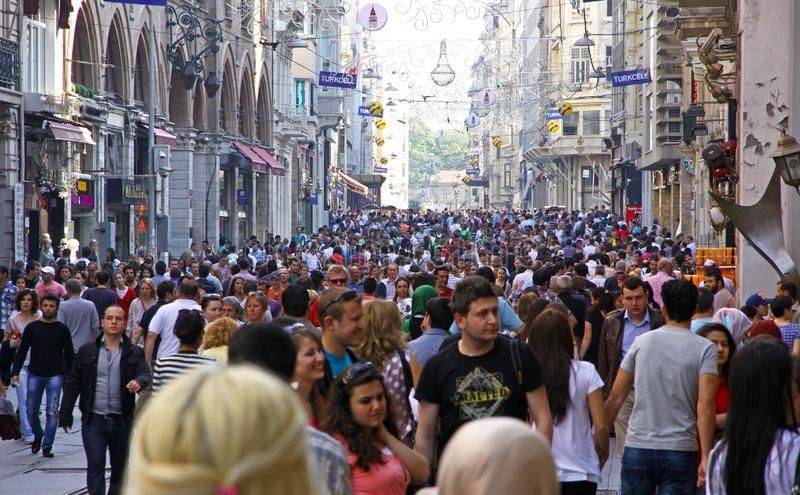Turkey is a large country with many cultural distinctions as you travel throughout it and up and down its length. This tourist dress code in Turkey guide can help you decide what to wear in Turkey. We’ve got you covered, from the dress code at the Blue Mosque to the beaches (see what we did there?).
Before we start ahead if you want to apply for a turkey visa online quickly and conveniently in just 5 minutes or 3 simple steps, visit our website www.turkeyvisaonline.com.
From the south’s sun-drenched beaches to the north-west and west’s cosmopolitan metropolis, to the south’s more conservative towns and cities, to the east and southeast’s more traditional districts. Everywhere you walk in Turkey, you will see a million distinct traditions and fashions.
The clothing code in Turkey, especially at religious places, is something that many visitors get wrong.
There are no difficult and fast laws on what you should and shouldn’t wear in Turkey. This is something we should mention. Egypt, Saudi Arabia, Iran, and Pakistan are more conservative than Turkey.
While preparing your Turkey packing list, keep in mind that the dress code in Turkey is often flexible, and you can wear anything you like. If you opt to wear anything you want, you may find yourself attracting unwelcome attention in locations where your decision is not in line with what the locals are used to.
So, while you won’t offend anyone, you may find yourself being stared at or whispered about, which will make you feel uncomfortable.
Formal clothing advice varies based on where you’ll vacation in Turkey to complicate matters.
Let’s go through the central regions in-depth to assist you to avoid making mistakes and feeling out of place and offer you some suggestions for what to dress in Turkey and how to prevent over (or under) packing your bags.
First things first, mosque etiquette.
When Visiting A Mosque Or Religious Sites, What Should You Wear?

The regulations for what to dress in a mosque are the same no matter where you are in Turkey. The dress code for mosques is the same all around the world.
Be humble.
“Is there a Blue Mosque dress code?” I’m frequently asked.
Yes, there are dress codes for the Blue Mosque and all other mosques in Turkey.
Pack Socks In Your Day Bag
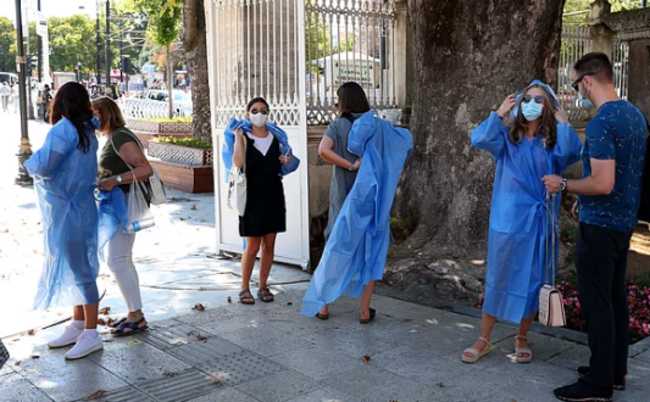
Everyone must take off their shoes prior to entering the Blue Mosque, which means you’ll need some socks.
Consider A Shoe Bag
You’ll leave your shoes outside the mosque. Most mosques will provide a spot to put your shoes on, but it’s difficult to predict if they will be secure or straightforward to find when you visit, especially at Istanbul’s most famous mosques during peak tourist season. Consider using a shoe bag to store your shoes inside your backpack if you’re in a hurry or have expensive travel shoes.
Shoes that are easy to put on and take off are recommended.
You’ll be standing there with dozens of other people, all trying to tie and untie shoelaces at the exact moment. If you opt to wear shoes that are easy to put on and take off, you will be grateful.
Pack A Head Cover
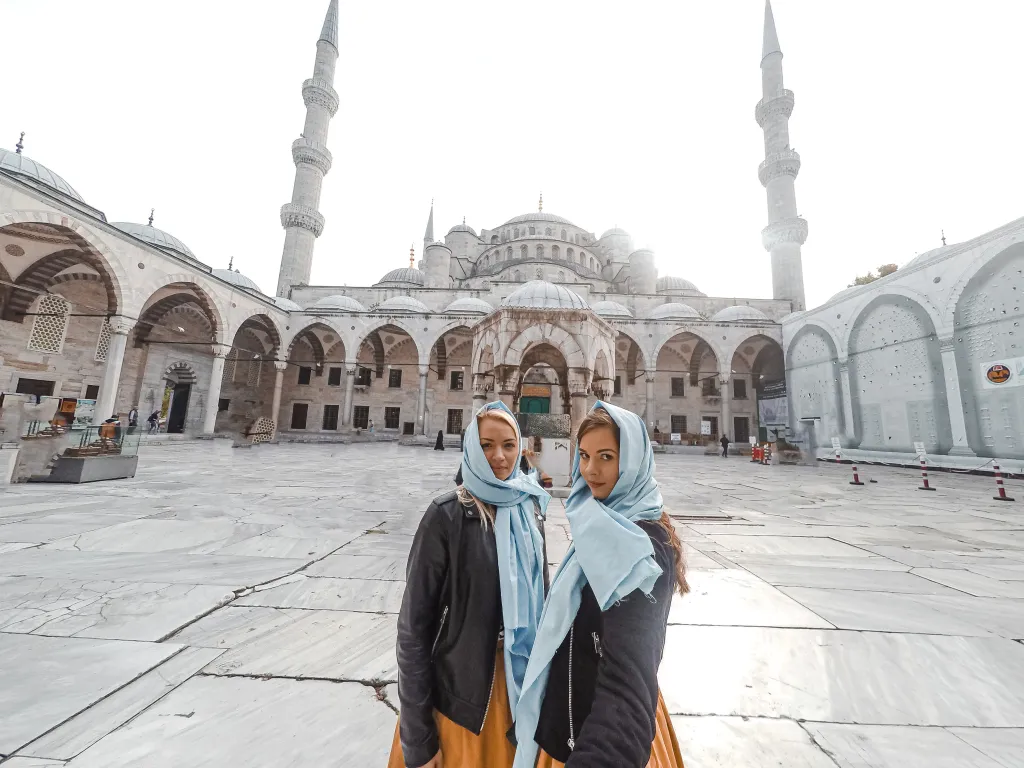
In addition to wearing respectful clothing, women must cover their heads and hair. You should bring your shawl or pashmina unless you want to borrow one from the mosque. One that is long enough to cover up your shoulders and wrap around your head.
Consider what you would be able to wear to be considered modest.
Women are not permitted to attend a mosque wearing the following items:
- Shorts
- Vest tops
- Tank tops
- Leggings
- Short skirts
Wearing loose-fitting silk pants or a long silky dress or skirt on the day you want to visit the mosque is a terrific choice.
If the attendant at the entrance believes what you’re wearing is appropriate, they’ll tell you and ask you to wrap a shawl over your midriff or your shoulders if necessary.
It’s far safer to be prepared than to borrow anything that dozens of other people will use that day; I recommend wearing a long-sleeved cotton shirt.
Men are likewise required to dress respectfully to attend the mosque. Men should not wear the following items in this situation:
- Vest tops
- Shorts
Wear long pants and a long-sleeved shirt on this day of travel. I’ve seen males wear a standard t-shirt in scorching temperatures.
Additional mosque etiquette: When visiting a mosque, be calm and respectful. Do not walk in front of anyone who is praying, and do not photograph anyone who is praying.
What Should You Wear in Turkey?
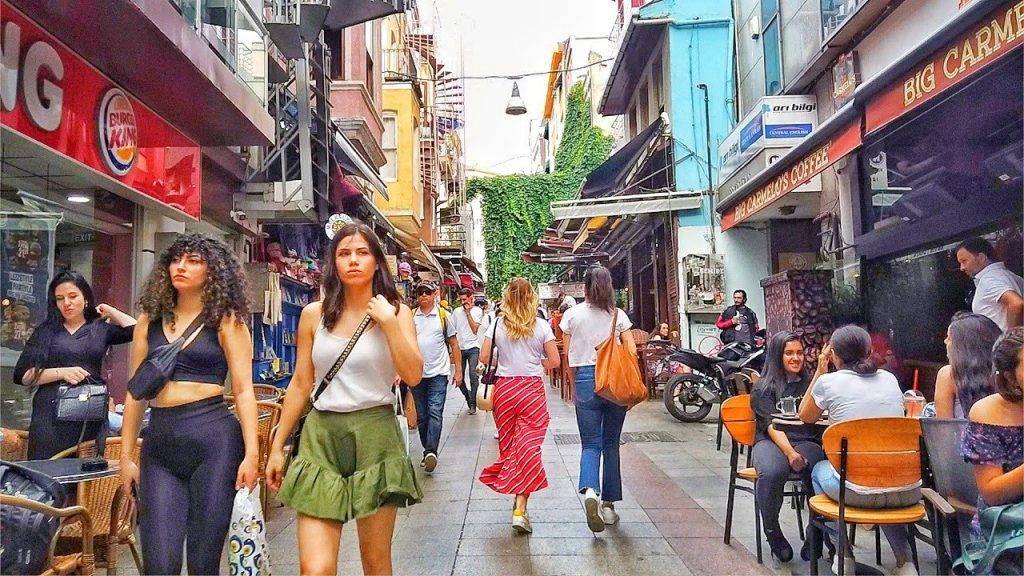
It’s easy to figure out what to bring for a trip to Turkey. However, you should be aware that the rules for what to dress in Turkey vary depending on where you want to go.
What To Wear To Beach Resorts In Turkey?
If you’re visiting a beach resort on Turkey’s south coast, the rules for what to dress are the same as they are anywhere else in Europe.
On the beach, you’ll witness individuals wearing bikinis and, in some cases, topless sunbathing; nevertheless, this is not something to promote. Remember that Turkey is a Muslim and conservative country, and no one will say anything to you about it.
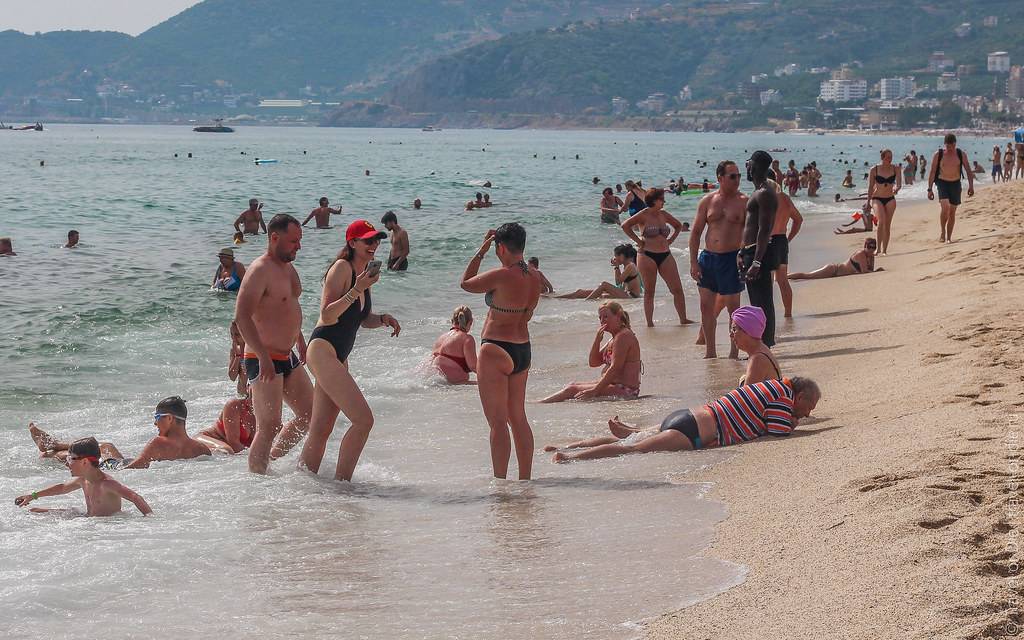
You may wear whatever you want when you go out at night. You could get stared at if you’ve dressed too revealingly, especially if you’re a woman.
However, this section of Turkey is, for the most part, much more laid-back, and you won’t attract unwelcome attention to the tourist destinations.
What To Wear In Izmir And Istanbul?
Dress code for Izmir: Even though Istanbul and Izmir are pretty far apart in terms of distance, their vibes are pretty similar. Izmir is a fairly cosmopolitan city with a youthful vibe. As a result, you can wear whatever you like, but avoid anything too low-cut or too short.
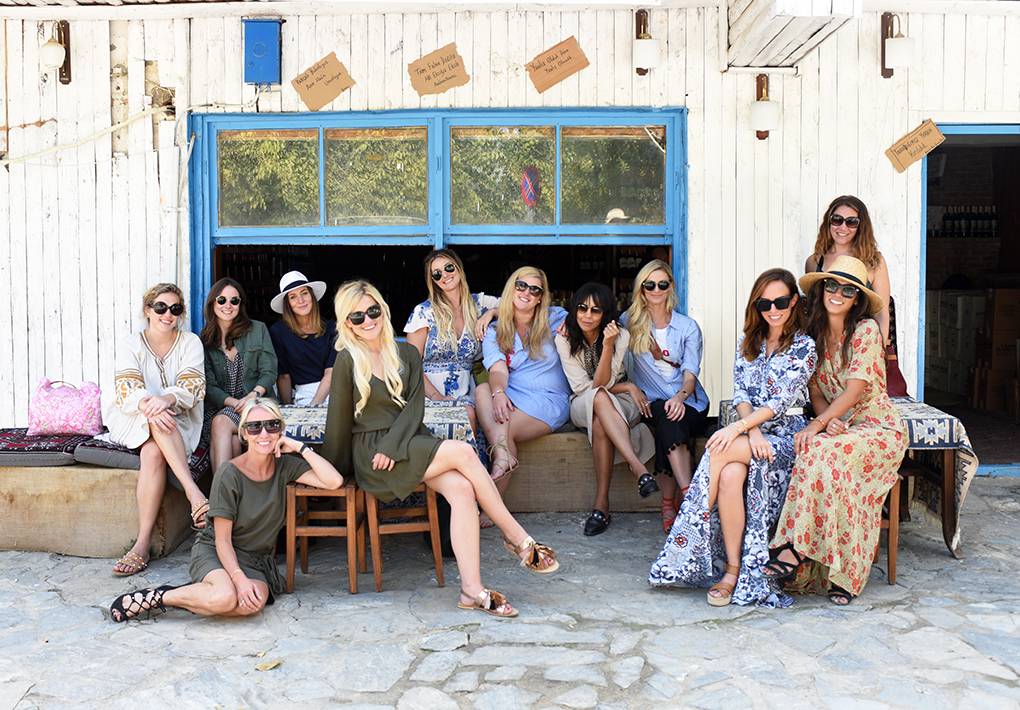
Dress code for Istanbul: The same rules apply in Istanbul; however, keep in mind that many districts of Istanbul are historically significant, necessitating some caution in terms of clothing. If you’re visiting Taksim, you may wear almost anything. If you’re visiting Sultanahmet, the historical and architectural district, you should dress respectfully and avoid wearing short skirts, short shorts, tank tops, etc.

In the summer, sleeveless shirts are alright, and you’ll notice a lot of visitors wearing shorts, but pay attention to the length – and how tight the shorts are.
Central and Northern Turkey Dress Etiquette
You may wear nearly anything if you’re going to central Turkey, such as Cappadocia, Ankara (the capital city), or the north coast. However, you should be aware that this country region is more conservative than the large towns and beach resorts we’ve previously visited.
Women: should consider long flowing skirts instead than booty-baring denim shorts. Also, choose modest shorts over low-cut or short tank tops.
Men: Nothing I can think of would upset the locals so that you can dress as usual.
What To Wear In Eastern And Southeast Turkey?
This is where you pay attention to what you bring. The south-eastern region of Turkey, in particular, is mainly traditional, which implies modest clothing is required.
Men: should avoid vest tops and wear jeans or long trousers and t-shirts.
Women: should bring below-the-knee skirts and dresses and avoid wearing tank tops of any type. In the summer, t-shirts are OK, but sleeves should be kept below the elbow. Here, cotton is your best friend; buy a flowing cotton shirt or a poly-cotton sundress.
What To Wear In Turkey In Summer, Winter & Beyond
- What to dress in the summer in Turkey: Summer in Turkey means heat. Summer days can reach the low 30s (degrees Celsius), so bring light, flowing dresses and linen pants. Nothing without a back or thin shoulder straps is a good idea.

- Packing for winter in Turkey: Oh, boy, it gets chilly! It will be as low as 6 or 8 degrees on certain days, so bring a warm down jacket, woolly winter socks, travel boots, and a hat and gloves.
- Packing list for Turkey in September & fall tips: It starts hot and quickly cools down. Sleeves, as well as an excellent windproof jacket and scarf, are your best friends here.
- How to dress in Turkey in April & spring: It is cold at first in March, but soon it becomes bright and comfortable. It’s a great idea to dress up in layers, which can be swapped out fast, like in the fall. Tights to wear beneath your dress and an anorak to wear with jeans and shorts.
In Turkey, it is customary to cover one’s head.
In Turkey, there is an equal number of women who cover their heads and those who do not. It’s a personal taste, not a must. That means you’ll be OK walking down the street in your usual clothing (modestly chosen) without having to cover your head, and you won’t have any problems.
Though you’ll need something to cover your shoulders, why not bring something that you can also wear over your head?
There are no tough and quick laws in Turkey regarding what to dress and what not to wear — think modestly.
What Else Should You Bring To Turkey?
Now that we’ve covered what to pack for Turkey, here are a few more items to remember to include in your Turkey packing list all year:
- Sunglasses. Consider the wrinkles.
- Hat. The blazing sun is wonderful on vacation, but a red face is not.
- Sunscreen. It’s a good idea to bring your food. Otherwise, you risk overpaying for pricey selections offered at tourist attractions.
- A cross-body bag. This is especially useful in Istanbul’s Bazaar, where pickpockets target travellers at peak hours.
- An Anti-theft bag. A slash-proof bag or one with additional anti-theft features is a terrific choice if you want to be extra safe.
- Toilet paper. It is a type of toilet paper used to. It may seem unusual but going across Turkey might mean finding a small hose instead of toilet paper. Of course, tourists will find toilet paper at tourist locations, but who wants to enter to discover an empty paper roll?
- Travel Umbrella. To be safe, bring a small and light one.
Applying for a turkey e visa online and packing your bags for Turkey will be simple if you keep in mind the traditions in the indicated locations and dress modestly.
